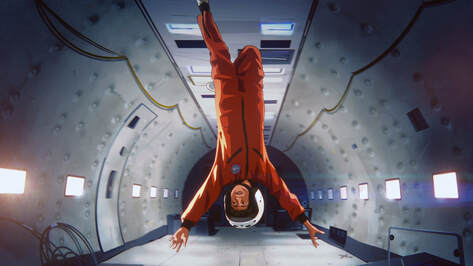B+ | A boy living in Houston in the 60's goes to theme parks, the local Baskin Robbins, and the moon. Directed by Richard Linklater Starring Milo Coy, Bill Wise, and Lee Eddy Review by Jon Kissel |

Linklater’s early childhood took place in more or less the same corner of the world as Stanley’s, and at approximately the same time. It’s old hat to talk about the specific leading into the universal when it comes to filmmaking, and Apollo 10 ½ is stuffed with the specific. The first scene contains a schoolyard punishment so precise that it must be true, down to the way that kids figured out how to make it more tolerable. Half-frozen bologna sandwiches seem to come from a real sensual place. The sound of paddles on butts was probably finetuned in the editing room, to the wincing of Linklater and anyone else old enough to know what that sounded and/or felt like. Conversely, the stuff that young Linklater didn’t experience has the same gauzy recollective feeling, where the pause that Stanley takes as he climbs down the ladder to the moon’s surface is the same moment of anticipation as when he’s about to go down a steep ride at Astroworld. The rotoscoping effect that Linklater has used before adds to the time-out-of-place feeling, like there’s something close to truth and accuracy in the film but the edges are blurry and distorted.
Apollo 10 ½ is helped in its aim to to have a foot in the real and the fantastical because what is real feels so fantastical. The level of recklessness towards parenting and public health is so extreme compared to now that it may as well have been a made-up story. Some of this persisted into the 90’s from my own experience of small-town living, but that’s after stranger danger and the Satanic Panic so nowhere near the level depicted here. There’s a certainty that everyone has everyone else’s best interests at heart, so sure, send the kids to play in the poison mist truck as it sprays for mosquitos. Play in the soggy field behind the waste treatment plant. Shoot a child into space! Despite all the injuries, there is still a deep romanticism around living like this. Locking children in hermetic bubbles feels like something is being stolen from them. Pandemic notwithstanding, how could the 2070 version of this movie, looking back on this period, be anywhere as compelling?
What this film and that theoretical one would have in common is that they both would take place in pivotal times. Stanley’s parents (Bill Wise and Lee Eddy) take the significant cultural changes with general good humor, and Stanley’s too young to know any better, but Houston is porous enough that some of the wider world gets in, particularly in Vietnam. The fundamental dilemma for a postwar (white) American is the reconciliation of the painful reality of how so many live and have lived with the comfort-drenched, ahistorical place that they live. That’s taking into account how close the Vietnam War was to the average person and the resulting unrest caused by it, especially compared to the completely ignorable and censored War on Terror period that we’ve grown up in. Stanley’s waking up to the contradictions in this period, where he’s supposed to care about starving Vietnamese children but not enough that he doesn’t want bombs dropped on them. However, American life is so expansive that this becomes just one part of a broader existence, allowing Stanley to consider his place in the world and then move on to the next thing. A kid that strolls this casually into a space shuttle isn’t going to be weighed down with moral calculations.
Apollo 10 ½ provides an enchanting picture of American life with just enough side-eyed criticism. That criticism keeps it from being a those-were-the-days boomer nostalgia trip, and the bonus of the space adventure gives the viewer more to think about in the aftermath. If it was played straight, Apollo 10 ½ would be charming but weightless. Linklater’s obvious love for the era and setting covers the charm, and his spin adds the heft. B+
 RSS Feed
RSS Feed